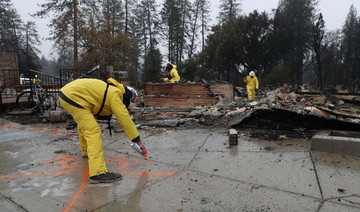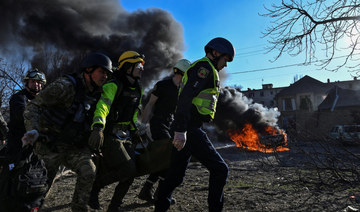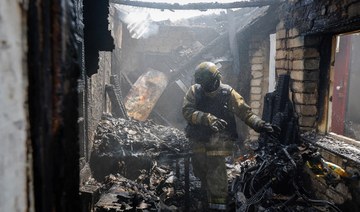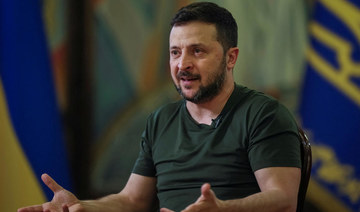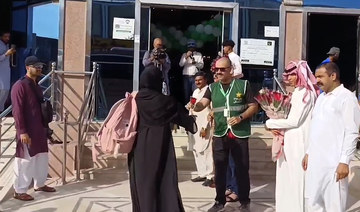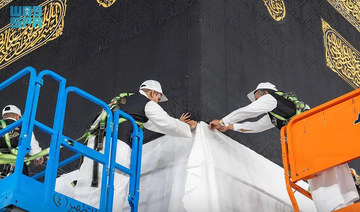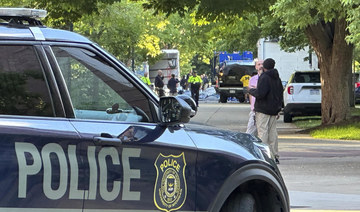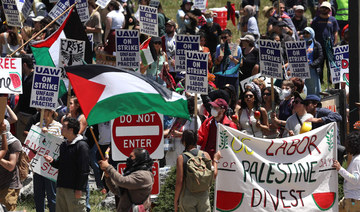LOS ANGELES: The deadliest and most destructive fire in California’s history was finally brought totally under control by firefighters, more than two weeks after it erupted, authorities said on Sunday.
The so-called Camp Fire, which broke out on November 8, is so far known to have killed 85 people.
The Butte County Sheriff’s department said that they had mistakenly added two people to an earlier death toll of 87.
However late Sunday they increased the number of missing people to 296 from 249 — still considerably lower than the 474 reported missing on Friday.
“#CampFire ... is now 100% contained,” Cal Fire, the state fire authority, said in a bulletin on Twitter.
Only 54 of the fatalities have been identified, according to the local sheriff’s office in Butte County, a rural area north of the state capital Sacramento.
A total of 153,336 acres were affected by the fire, with nearly 14,000 homes and hundreds of other structures destroyed.
Heavy downfalls that have soaked the fire zone in the past days helped douse the remaining flames, but also made it more difficult for crews searching for bodies.
The Camp Fire was the second major blaze to hit California in recent weeks with a fire in the Malibu area near Los Angeles also killing three people.
The smoke from the Camp Fire was so intense that schools in San Francisco had to close at one point earlier this month as did the city’s famed cable car and Alcatraz Island.
California’s governor, Jerry Brown, has warned that the state can expect a growing number of major fires as a result of global warming.
US President Donald Trump, who visited one of the worst-hit towns called Paradise last weekend, caused some consternation by saying that the fires were due in part to forestry mismanagement.
Ahead of the announcement that the fire has been totally tamed, authorities had already begun letting residents return to some of the worst hit areas to inspect the damage to their homes.
In a joint bulletin posted on Saturday, the police and fire service said evacuation orders that had in place for some areas over the last fortnight were being lifted for both residents and non-residents, while warning that essential services were still “very limited.”
“Prior to returning home, residents are encouraged to take steps to ensure they have food, water and fuel for their vehicles,” said the statement.
While Brown has warned that mega fires such as those in Butte and Malibu will cease to be “abnormal” events, the state has allocated about $1 billion over the next five years for fire prevention.
Much of the cash will go on education and suppression activities such as clearing grasses and other vegetation, according to officials.
But many experts are calling for more restrictions on housing being built in forests as a means of eliminating danger before the blazes even break out. “I think people are thinking about if there is a way we can design the new Paradise that can look like more of a European village or a ski town, and not have houses out in the forests,” Bill Stewart, co-director of the Center for Forestry at the University of California, Berkeley told AFP.
A recent study found that one third of all US houses now are located in what researchers refer to as the wildland-urban interface, where houses and forest vegetation intermingle.
While Trump has repeatedly expressed skepticism about global warming, a new report by his administration warned Friday that climate change will cost the US hundreds of billions of dollars annually by century’s end unless drastic action is taken to cut carbon emissions.
California’s deadliest wildfire finally tamed
California’s deadliest wildfire finally tamed
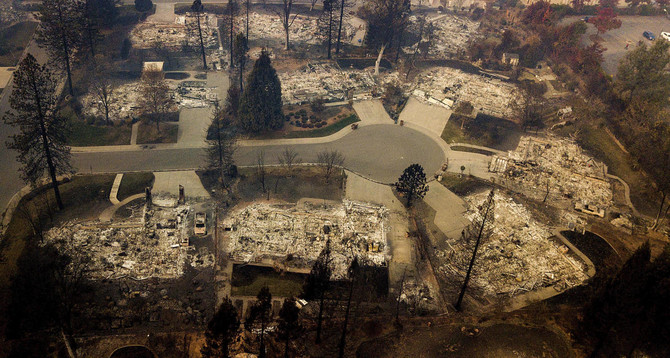
- A total of 153,336 acres were affected by the fire, with nearly 14,000 homes and hundreds of other structures destroyed
- Heavy downfalls that have soaked the fire zone in the past days helped douse the remaining flames, but also made it more difficult for crews searching for bodies
Group of graduates walk out of Harvard commencement chanting ‘Free, free Palestine’

“I am deeply disappointed by the intolerance for freedom of speech and the right to civil disobedience on campus”
CAMBRIDGE: A group of graduates walked out of the Harvard commencement chanting “Free, Free Palestine” after weeks of protests on campus.
School officials announced Wednesday, the day before Thursday’s graduation, that 13 Harvard students who participated in a protest encampment would not be able to receive degrees alongside their classmates.
Some students chanted “Let them walk, let them walk walk,” during Thursday’s commencement, referring to allowing those 13 students to get their degrees along with fellow graduates.
Harvard University held its commencement address Thursday following a weekslong pro-Palestinian encampment that shut down Harvard Yard to all but those with university ties and roiled tensions on the campus.
Those tensions were ticked up a notch on Wednesday when school officials announced that 13 Harvard students who participated in the encampment won’t be able to receive degrees alongside their classmates. Some students chanted “Let them walk, Let them walk,” during commencement.
Student speaker Shruthi Kumar said “this semester our freedom of speech and our expressions of solidarity became punishable,” she said to cheers and applause.
She said she had to take a moment to recognize “the 13 undergraduates in the class of 2024 who will not graduate today,” Kumar said to prolonged cheers and clapping. “I am deeply disappointed by the intolerance for freedom of speech and the right to civil disobedience on campus.”
Over 1,500 students had petitioned, and nearly 500 staff and faculty had spoken up, all over the sanctions, she said.
“This is about civil rights and upholding democratic principals,” she said. “The students had spoken. The faculty had spoken. Harvard do you hear us?”
Those in the encampment had called for a ceasefire in Gaza and for Harvard to divest from companies that support the war.
Also on Thursday, the leaders of Northwestern University and Rutgers University are expected to testify at a House Committee on Education and the Workforce hearing about concessions they gave to pro-Palestinian protesters to end demonstrations on their campus. The chancellor of the University of California, Los Angeles, also was scheduled to appear at the latest in a series of hearings looking into how colleges have responded to the protests and allegations of antisemitism
The decision by the school’s top governing board follows a recommendation Monday by faculty members to allow the 13 to receive their degrees despite their participation in the encampment.
Harvard’s governing board, the Harvard Corporation, however said that each of 13 have been found to have violated the university’s policies by their conduct during the encampment protest.
“In coming to this determination, we note that the express provisions of the Harvard College Student Handbook state that students who are not in good standing are not eligible for degrees,” the corporation said in a written statement.
The statement left open the possibility of an appeals process saying the corporation understands “that the inability to graduate is consequential for students and their families” and supports the Faculty of Arts and Sciences’ intention to provide an expedited review of requests for appeal.
“We care deeply about every member of our community — students, faculty, staff, researchers, and alumni — and we have chosen a path forward that accords with our responsibilities and reaffirms a process for our students to receive prompt and fair review,” the statement added.
Supporters of the students said the decision not to allow them to receive degrees at commencement violated a May 14 agreement between interim President Alan Garber and the Harvard Out of Occupied Palestine coalition that would have allowed the students to graduate.
Protesters against the war between Israel and Hamas voluntarily dismantled their tents after they said university officials agreed to discuss their questions about the endowment, bringing a peaceful end to the kinds of demonstrations that were broken up by police on other campuses.
The group issued a statement late Wednesday saying the decision jeopardizes the post-graduation lives of the 13 students.
“By rejecting a democratic faculty vote, the Corporation has proved itself to be a wholly illegitimate body, and Garber an illegitimate president, accountable to no one at the university,” the group said.
“Today’s actions have plunged the university even further into a crisis of legitimacy and governance, which will have major repercussions for Harvard in the coming months and years,” the group said,
There was a noticeable presence of police officers around the campus Thursday mixing with soon-to-be-graduates, their family members and sidewalk flower sellers.
A small plane circled above trailing an Israeli and US flag. A truck was parked outside the campus with an electronic billboard with the names and images of some of the pro-Palestinian protesters under the banner “Harvard’s Leading Antisemites.”
At Drexel University in Philadelphia, protesters packed up their belongings and left a pro-Palestinian encampment Thursday after the school announced a decision to have police clear the encampment. A wave of pro-Palestinian tent encampments on campuses has led to over 3,000 arrests nationwide.
Russia says main power line to Zaporizhzhia nuclear plant goes down, no safety threats
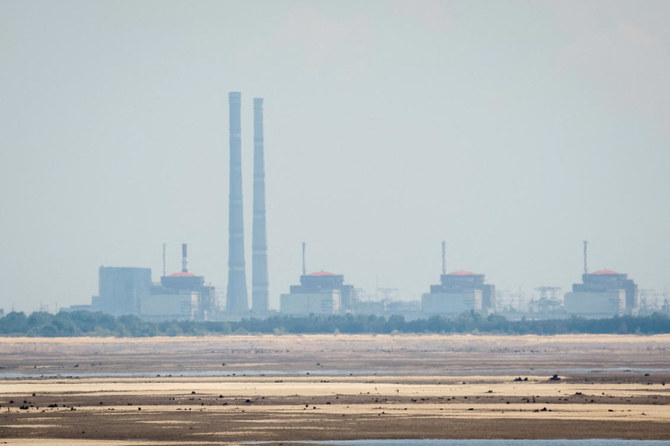
- The reasons for the outage, which had not caused any change in the radiation level, were being investigated
- The main 750 kilovolt (kV) “Dniprovska” power line went down at 13.31 local
MOSCOW: Russia said on Thursday that the main power line supplying the Russian-controlled Zaporizhzhia nuclear power plant (ZNPP) in Ukraine had gone down, but that there was no threat to safety and the plant was being supplied via a backup line.
The six reactors at the Zaporizhzhia plant, held by Russia and located close to the front line of the conflict in Ukraine, are not in operation but it relies on external power to keep its nuclear material cool and prevent a catastrophic accident.
The Russian management said on their official channel on the Telegram app that the reasons for the outage, which had not caused any change in the radiation level, were being investigated.
It said the main 750 kilovolt (kV) “Dniprovska” power line went down at 13.31 local (1031 GMT), while the 330 kV “Ferosplavnaya” line was supplying power to the plant now.
The main “Dniprovska” power line also went down for almost five hours on March 22, highlighting what the International Atomic Energy Agency (IAEA) said were “ever present dangers to nuclear safety and security” from the Russia-Ukraine war.
Russia and Ukraine have each accused the other at various times of shelling the Zaporizhzhia plant, which is Europe’s largest.
IAEA has said that the ZNPP has been experiencing major off-site power problems since the conflict began in early 2022, exacerbating the nuclear safety and security risks facing the site.
US will announce $275 million more in artillery and ammunition for Ukraine, officials say
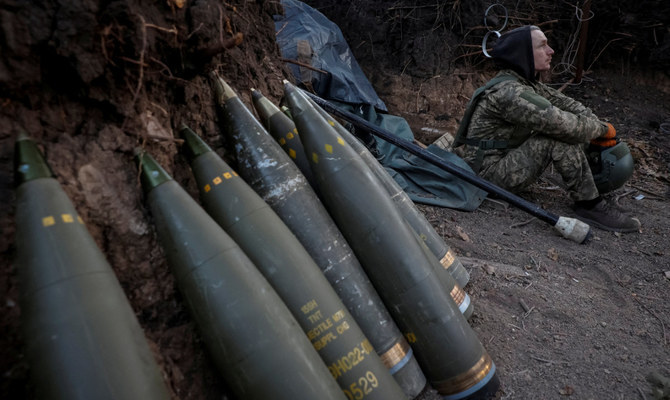
- This will be the fourth installment of military aid for Ukraine since Congress passed a long-delayed foreign aid bill late last month
- Russia has sought to take advantage of Ukrainian shortages in manpower and weapons while the war-torn country waits for the arrival of more US assistance
WASHINGTON: The United States is expected to announce an additional $275 million in military aid for Ukraine on Friday as Kyiv struggles to hold off advances by Russian troops in the Kharkiv region, two US officials say.
This will be the fourth installment of military aid for Ukraine since Congress passed a long-delayed foreign aid bill late last month and comes as the Biden administration has pledged to keep weapons flowing regularly and to get them to the front lines as quickly as possible.
The package includes high mobility artillery rocket systems, or HIMARS, as well 155 mm and 105 mm high-demand artillery rounds, according to the two US officials. They spoke on the condition of anonymity to provide details of the aid package before the public announcement.
It follows a monthly gathering Monday of about 50 defense leaders from Europe and elsewhere who meet regularly to coordinate getting more military aid to Ukraine. At this latest meeting, Defense Secretary Lloyd Austin said Ukraine was in a “moment of challenge” due to Russia’s new onslaught on Kharkiv, Ukraine’s second-largest city. He pledged to keep weapons moving “week after week.”
Russia has sought to take advantage of Ukrainian shortages in manpower and weapons while the war-torn country waits for the arrival of more US assistance, which was delayed for months in Congress. Ukrainian forces have been pushed backward in places, while Russia has pounded its power grid and civilian areas.
In the month since President Joe Biden signed the $95 billion foreign aid package, which included about $61 billion for Ukraine, the US has announced and started to send almost $1.7 billion in weapons pulled from Pentagon stockpiles.
It’s also announced $6 billion in funding through the Ukraine Security Assistance Initiative. That pays for longer-term contracts with the defense industry and means that the weapons could take many months or years to arrive.
With this latest package, the US has now provided almost $51 billion in military assistance to Ukraine since Russia invaded in February 2022.
First pilgrims from Philippines depart for Hajj 2024
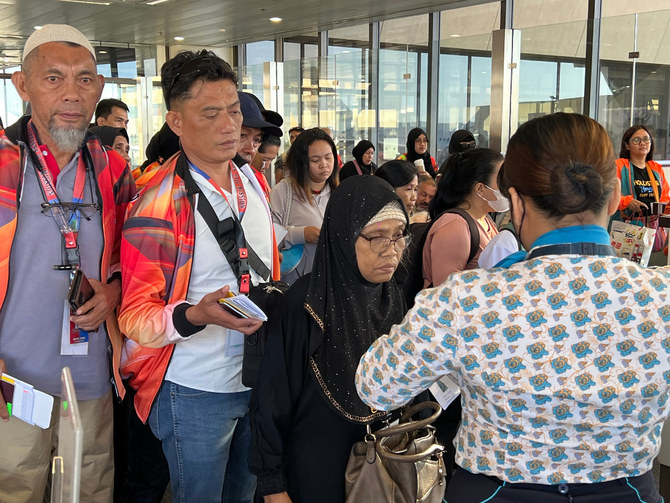
- About 5,000 Filipino Muslims are set to perform Hajj this year
- Muslims make up 10 percent of majority Catholic Philippine population
MANILA: The National Commission on Muslim Filipinos sent off the first group of Hajj pilgrims on Thursday, marking the beginning of the annual pilgrimage season for Muslims from the predominantly Catholic Philippines.
Muslims constitute about 10 percent of the nearly 120 million Philippine population, with most living on the island of Mindanao and the Sulu archipelago in the country’s south, as well as in the central-western province of Palawan.
With the Hajj this year expected to start on June 14 and end on June 19, many pilgrims depart early to make the most of the spiritual journey that is one of the five pillars of Islam.
The Philippines’ first group of 150 pilgrims left early on Thursday morning from the main airport in Manila, making the first leg of their journey to Madinah via Oman.
“The Hajj is not merely a journey undertaken for personal fulfillment, it is a profound act of devotion symbolizing unity, equality and submission to the will of the Almighty Allah,” NCMF Secretary Sabuddin Abdurahim said during the sendoff ceremony.
NCMF is the body governing Muslim affairs in the Philippines, in charge of organizing the annual Hajj pilgrimage.
“As we bid farewell to our beloved pilgrims embarking on the sacred journey to Saudi Arabia for Hajj, my heart is filled with prayers for your safety, security and the smoothest of journeys,” Abdurahim said.
“I fervently pray that this year’s Hajj is free from any hurdles of challenges, ensuring a profound spiritual experience for each of you.”
About 5,000 Muslims have confirmed their travel to Saudi Arabia for the pilgrimage this year, the NCMF said.
Hapidz Yusop, a pilgrim from Sulu, said that he was fulfilling his dream of doing the sacred pilgrimage.
“It’s been my lifelong dream. I’ve been planning to do the Hajj for a long time, but I don’t have the means, I don’t have the money. But by the mercy of God and the help of our mayor in Talipao, I’m finally here,” he told Arab News, referring to how his arrangements for Hajj were sponsored by the local government in Talipao.
“It feels like we are born again, that we will be cleansed of all of our sins and be born again. May God give us mercy,” Yusop said.
Rahyan Tulawi Amaraja, a 30-year-old nurse from Sulu’s Jolo island, will embark on this year’s Hajj with her parents.
“It has been my aspiration since I was a child to perform my pilgrimage. Fortunately, I will perform my Hajj journey with my parents, which is one of my aspirations, too,” she told Arab News.
“I am overwhelmed with joy,” she said. “For this Hajj journey, I wish to have Allah’s mercy and forgiveness, and to be able to perform it well and successfully.”
Pro-Palestinian protesters leave after Drexel University decides to have police clear encampment
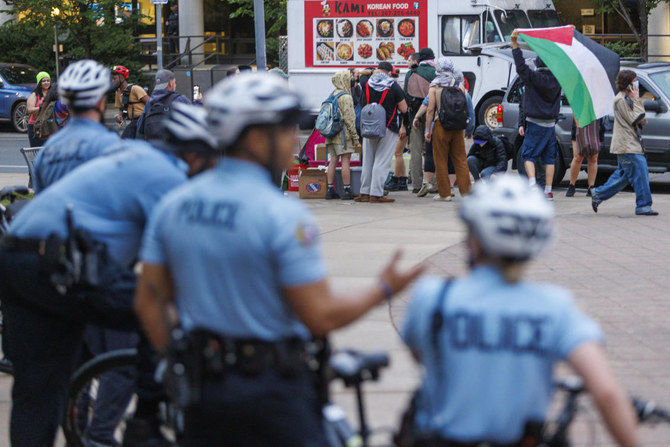
- News outlets reported that police gave protesters a warning to clear the encampment and protesters left
- “An unauthorized encampment that involves large numbers of people unaffiliated with Drexel trespassing on our campus is illegal,” Fry said
PHILADELPHIA: Protesters packed up their belongings and left a pro-Palestinian encampment at Drexel University on Thursday after the school announced a decision to have police clear the encampment.
University President John Fry said in a statement that he decided to have campus police and public safety officers join Philadelphia police in clearing the encampment as peacefully as possible.
News outlets reported that police gave protesters a warning to clear the encampment and protesters left. Protesters didn’t immediately comment.
Fry said the university is committed to protecting the community members’ right to assemble peacefully and express their views, but he has the responsibility and authority to regulate campus gatherings to ensure safety and fulfill the mission to educate students.
“An unauthorized encampment that involves large numbers of people unaffiliated with Drexel trespassing on our campus is illegal,” Fry said. “The language and chants coming from this demonstration, underscored by protesters’ repugnant ‘demands,’ must now come to an end.”
Protesters gathered their belongings as dozens of officers on bicycles arrived around 5:20 a.m., but in less than a half hour only a few items remained on the Korman Family Quad where the 35-tent encampment had been, the Philadelphia Inquirer reported.
“The campers picked up their belongings for the most part and left by their own free will,” Philadelphia Police Sgt. Eric Gripp said.
The encampment had persisted despite Fry’s threat earlier this week to have the encampment cleared. Fry said Tuesday that classes would be held virtually for a third day on Wednesday after administrators tried to open a line of communication to the protesters but were rebuffed. News outlets reported that the university announced Wednesday night that the campus would return to normal operations Thursday.
In his statement early Thursday, Fry said previous requests for protesters to disperse had been ignored, but he was asking Drexel affiliates to leave the encampment so police could “escort any remaining trespassers off our campus.”
A wave of pro-Palestinian tent encampments on campuses has led to over 3,000 arrests nationwide.
On Thursday, the leaders of Northwestern University and Rutgers University are expected to testify at a House Committee on Education and the Workforce hearing about concessions they gave to pro-Palestinian protesters to end demonstrations on their campus. The chancellor of the University of California, Los Angeles, also was scheduled to appear at the latest in a series of hearings looking into how colleges have responded to the protests and allegations of antisemitism.


